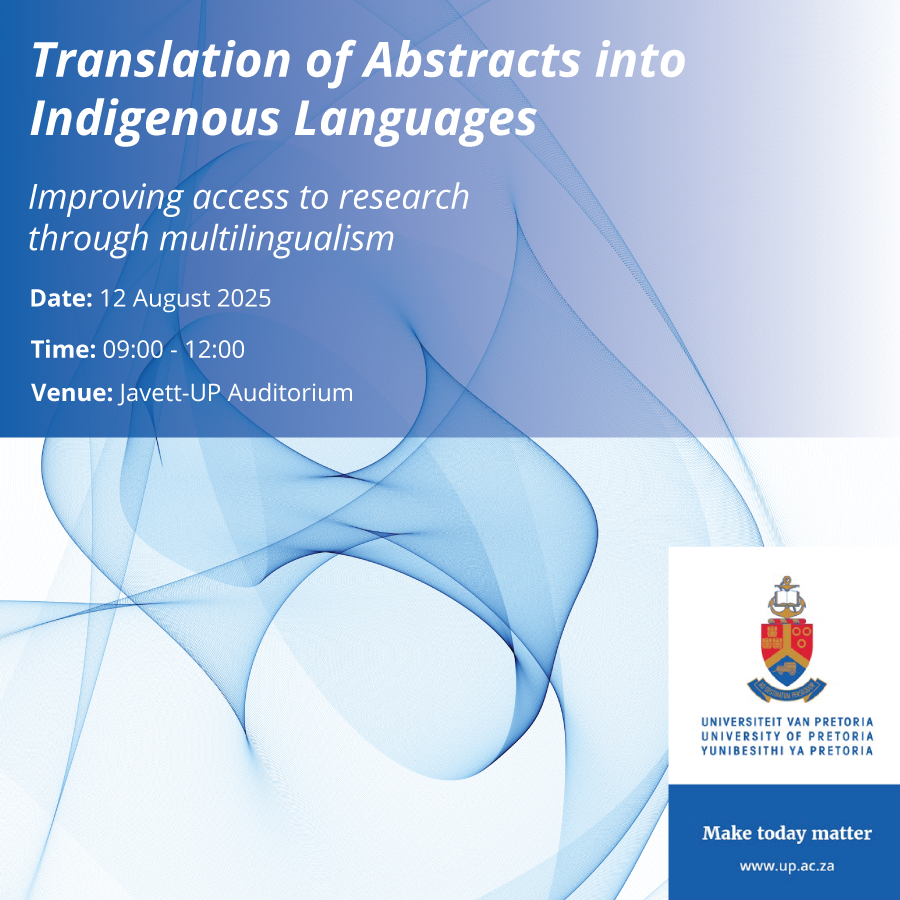Bridging the Gap: Translating UP Research Abstracts into Indigenous Languages
The University of Pretoria’s Department of Library Services, together with the Department of Computer Science, is launching a project that actually matters—putting academic research within reach of the people who need it most, in the languages they speak.

Date: Tuesday, 12 August 2025 Time: 09:00–12:00 (Central Africa Time) Venue: Javett Auditorium, Main (Hatfield) Campus Categories: Seminar RSVP: https://up-za.libcal.com/event/14796230
The University of Pretoria’s Department of Library Services, together with the Department of Computer Science, is launching a project that actually matters—putting academic research within reach of the people who need it most, in the languages they speak.
The Problem: UPSpace, the university’s online repository, makes research visible to the world—but mostly in English. This means a huge segment of South Africa’s population is locked out of scholarship that could benefit their communities, simply because of a language barrier.
The Solution: The Translation of Abstracts Project is a direct response to this inequality. For the pilot, we pulled 25 thesis abstracts and titles from across nine disciplines—ranging from Computer Science to Nursing—then translated them into Sepedi, isiZulu, and Afrikaans. The work wasn’t just dumped onto Google Translate; it was a collaboration between professional translators and AI language models, including those developed by UP’s Data Science for Social Impact (DSFSI) group and state-of-the-art LLMs like GPT-4 and Gemini.
Why Does It Matter? If research is supposed to serve society, it must be accessible. This pilot project is proof of concept: using both human expertise and AI, we can break down language barriers, promote indigenous languages, and push the university toward real linguistic equity. It’s not just about translation for translation’s sake; it’s about making sure knowledge gets out of the ivory tower and into communities where it can make a difference.
What’s Next? The event will share findings from the pilot: what worked, what didn’t, and what’s needed to scale up. We’ll cover the quality of translations (yes, the machines were put to the test against human translators), the technical and cultural hurdles, and how this fits into the bigger push for decolonizing knowledge at South African universities.
Who’s Involved? This is a genuinely transdisciplinary effort. Besides Library Services and Computer Science, the Data Science for Social Impact (DSFSI) group and AfriDSAI are on board, plus input from the UP Language Development Plan. Professional translators, AI developers, and academic reviewers all played a role.
Join Us—Online or In-Person If you care about open access, indigenous languages, or the future of AI in Africa, you want to be there. Help us push for a university—and a country—where research isn’t just for the English-speaking elite.
Reserve your spot: https://up-za.libcal.com/event/14796230